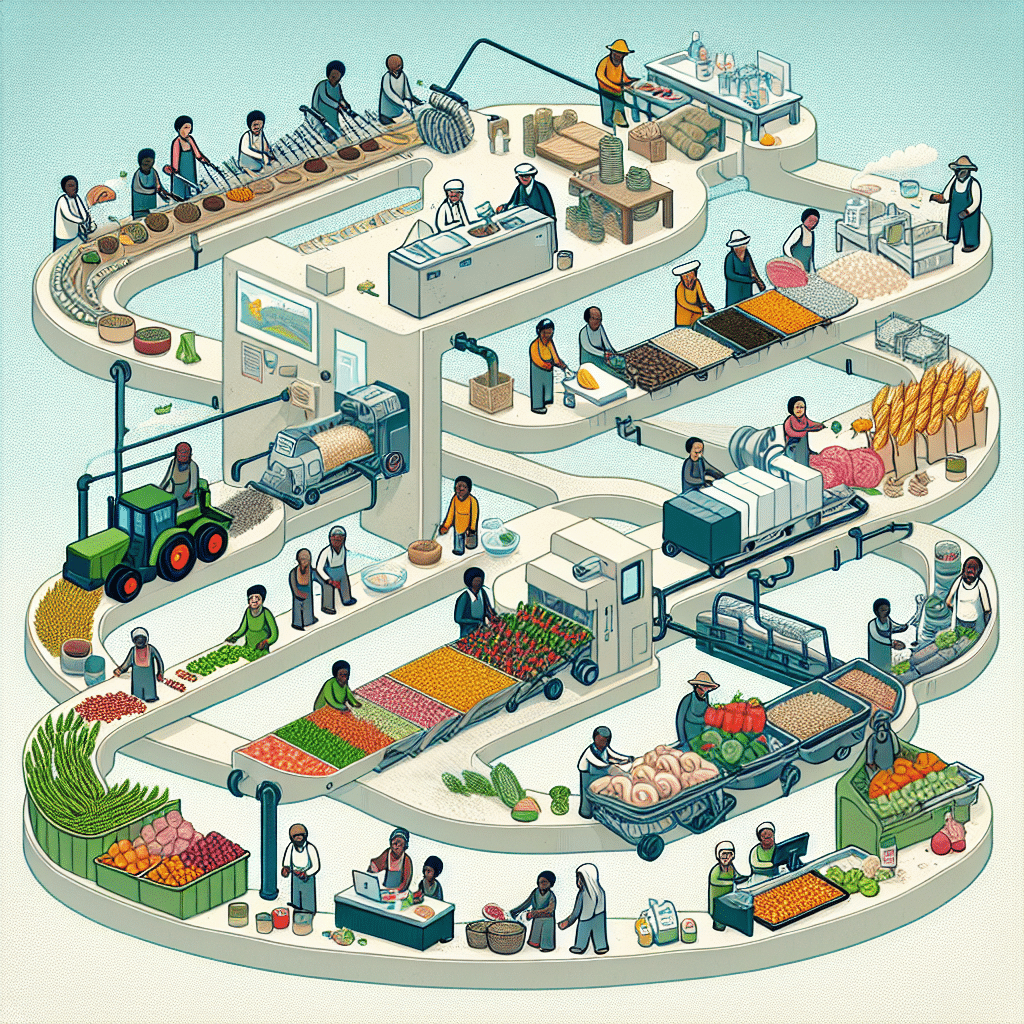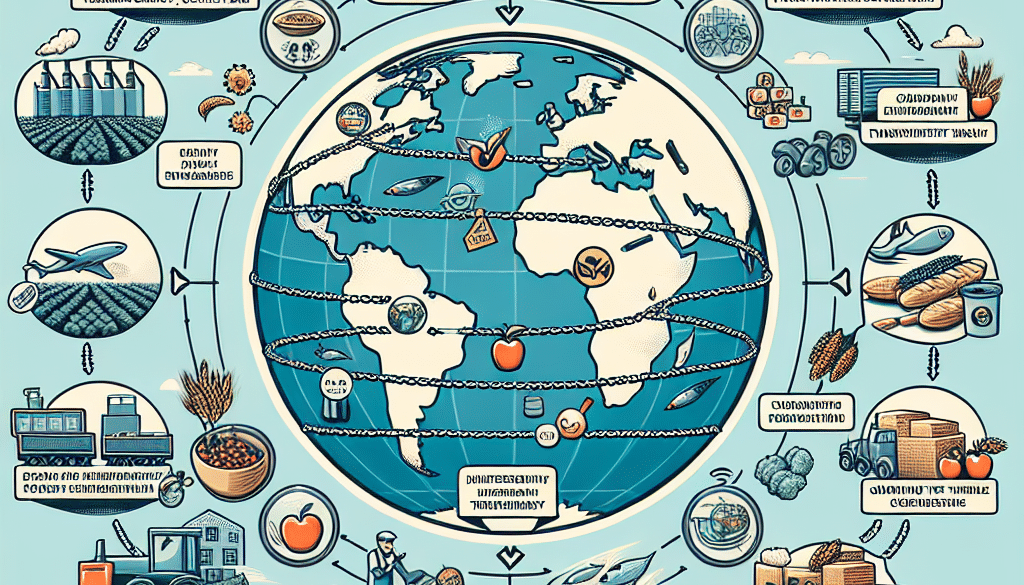Supply Chains: Ensuring Transparency in Food
-
Table of Contents
- Supply Chains: Enhancing Transparency in the Food Industry
- The Importance of Transparency in Food Supply Chains
- Challenges to Achieving Transparency
- Technological Innovations Promoting Transparency
- Case Studies and Examples
- Regulatory Efforts and Consumer Demand
- Statistics Highlighting the Need for Transparency
- Conclusion: The Future of Food Supply Chain Transparency
- ETprotein: Your Trusted Source for High-Quality Plant Proteins
Supply Chains: Enhancing Transparency in the Food Industry

The modern consumer is increasingly concerned about the origins and safety of their food. With growing awareness of environmental issues, health concerns, and ethical practices, there is a demand for greater transparency in food supply chains. This article delves into the importance of transparency in the food industry, the challenges faced, and the solutions being implemented to ensure that consumers can trust the food on their plates.
The Importance of Transparency in Food Supply Chains
Transparency in food supply chains is crucial for several reasons:
- Consumer Trust: Consumers are more likely to purchase products from brands that are open about their sourcing and production processes.
- Food Safety: Transparency helps in tracking and removing contaminated products from the supply chain, ensuring consumer safety.
- Sustainability: It encourages sustainable practices by allowing consumers to choose products that align with their environmental and ethical values.
- Regulatory Compliance: Many regions have strict regulations regarding food sourcing and safety, and transparency is key to compliance.
Challenges to Achieving Transparency
Despite its importance, achieving transparency in food supply chains is fraught with challenges:
- Complex Supply Chains: Modern food supply chains are often global and involve numerous stakeholders, making transparency difficult.
- Lack of Standardization: Differing regulations and standards across countries can complicate transparency efforts.
- Cost Implications: Implementing systems for greater transparency can be costly for suppliers and producers.
- Technological Barriers: Some stakeholders may lack the technology needed to track and share information effectively.
Technological Innovations Promoting Transparency
Fortunately, technological advancements are helping to overcome these challenges:
- Blockchain Technology: Blockchain can create a tamper-proof record of every transaction in the supply chain, from farm to fork.
- Internet of Things (IoT): IoT devices can monitor conditions during transport and storage, ensuring product quality.
- Big Data Analytics: Analyzing large datasets can help predict and manage supply chain disruptions.
- Cloud Computing: Cloud platforms enable stakeholders to share information seamlessly and in real-time.
Case Studies and Examples
Several companies and initiatives are leading the way in supply chain transparency:
- IBM Food Trust: Utilizing blockchain, this initiative brings together growers, processors, wholesalers, distributors, manufacturers, retailers, and others to ensure food safety and freshness.
- Fair Trade Certification: This certification ensures that products are made according to rigorous social, environmental, and economic standards.
- Direct Trade Coffee: Coffee roasters work directly with farmers, bypassing traditional supply chains, to ensure ethical practices and quality.
Regulatory Efforts and Consumer Demand
Governments worldwide are recognizing the need for transparency and are enacting regulations to enforce it. The European Union’s General Food Law is one example, requiring traceability at all stages of the food supply chain. Similarly, the U.S. Food Safety Modernization Act focuses on preventing contamination and ensuring quick action when safety issues arise.
Consumer demand is also driving change. A Nielsen global survey found that 73% of respondents would definitely or probably change their consumption habits to reduce their impact on the environment. This sentiment is pushing companies to adopt more transparent practices.
Statistics Highlighting the Need for Transparency
Recent statistics underscore the importance of transparency:
- A study by Label Insight revealed that 94% of consumers are likely to be loyal to a brand that offers complete transparency.
- The Food Marketing Institute found that 75% of consumers would switch to a brand that provides more in-depth product information, beyond what’s provided on the physical label.
Conclusion: The Future of Food Supply Chain Transparency
The future of food supply chains lies in transparency. As technology continues to evolve, it will play a pivotal role in ensuring that consumers have access to safe, sustainable, and ethically sourced food. Companies that prioritize transparency will not only gain consumer trust but will also be better equipped to manage risks and comply with regulatory requirements.
Ensuring transparency in food supply chains is not just a trend; it’s a necessity that benefits consumers, businesses, and the planet alike. The key takeaways for the food industry are clear: invest in technology, embrace regulatory changes, and listen to consumer demands. By doing so, the industry can build a more transparent, trustworthy, and sustainable future.
ETprotein: Your Trusted Source for High-Quality Plant Proteins
In line with the demand for transparency and quality in the food industry, ETprotein stands out as a leading provider of plant-based protein products. Their commitment to non-GMO, allergen-free, and organic ingredients ensures that consumers and manufacturers have access to the best plant proteins available.
ETprotein’s range of products, including Organic rice protein, clear rice protein, pea protein, and more, cater to various industries, from nutraceuticals to food and beverage. With a reputation for excellence and a portfolio of satisfied clients, including Fortune 500 companies, ETprotein is your go-to source for plant proteins that meet the highest standards of transparency and quality.
About ETprotein:
ETprotein, a reputable plant protein vegan protein Chinese factory manufacturer and supplier, is renowned for producing, stocking, exporting, and delivering the highest quality organic bulk vegan protein and plant proteins. They include Organic rice protein, clear rice protein, pea protein, clear pea protein, watermelon seed protein, pumpkin seed protein, sunflower seed protein, mung bean protein, peanut protein etc. Their offerings, characterized by a neutral taste, non-GMO, allergen-free attributes, cater to a diverse range of industries. They serve nutraceutical, pharmaceutical, cosmeceutical, veterinary, as well as food and beverage finished product distributors, traders, and manufacturers across Europe, USA, Canada, Australia, Thailand, Japan, Korea, Brazil, and Chile, among others.
ETprotein specialization includes exporting and delivering tailor-made protein powder and finished nutritional supplements. Their extensive product range covers sectors like Food and Beverage, Sports Nutrition, Weight Management, Dietary Supplements, Health and Wellness Products, and Infant Formula, ensuring comprehensive solutions to meet all your protein needs.
As a trusted company by leading global food and beverage brands and Fortune 500 companies, ETprotein reinforces China’s reputation in the global arena. For more information or to sample their products, please contact them and email sales(at)ETprotein.com today.












